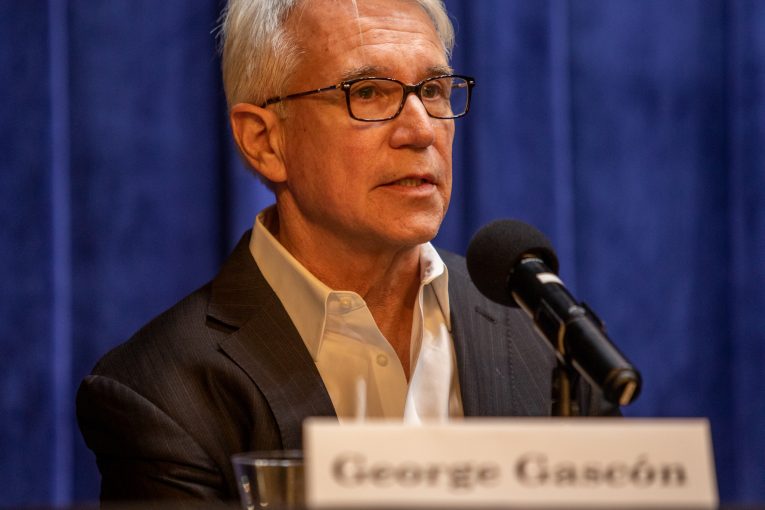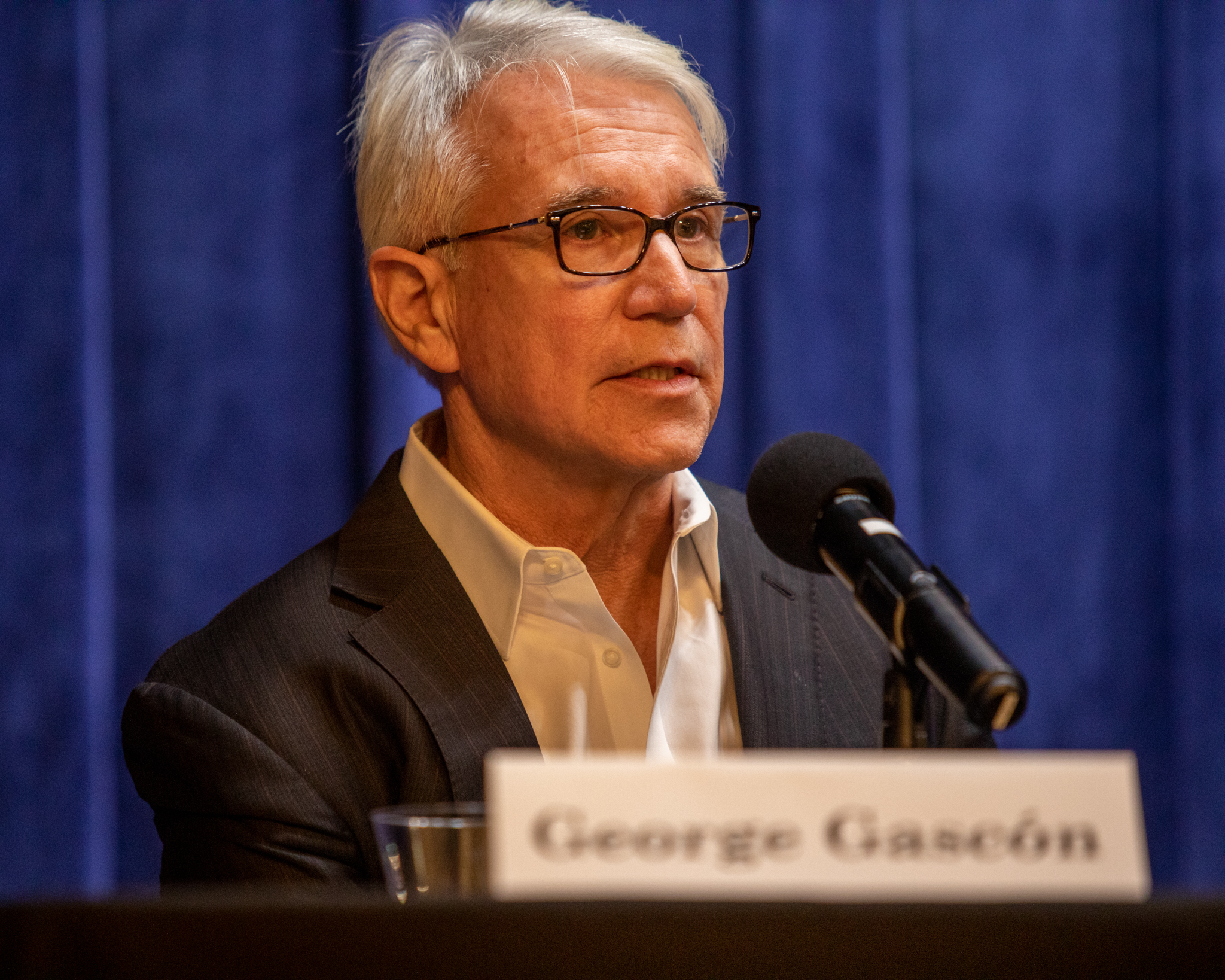

By Layla Mustafa
LOS ANGELES – George Gascón – set to be sworn in Dec. 7 as the 43rd Los Angeles District Attorney – publicly has released his new transition team, and those announced appear to be consistent with Gascón’s promise for prosecutorial reform in LA.
Supporters of Gascón note that he is able to follow through on campaign promises, the results should have tremendous influence throughout not only throughout LA county, but the country.
As the home to the nation’s largest jail system and prosecutorial office, significant criminal justice reform the county could have nationwide implications.
This past November saw a highly competitive race in which incumbent District Attorney Jackie Lacey lost her position of 30 years to Gascón.
The results of the race were reflective of a greater nationwide call for social justice and accountability towards law enforcement agencies following the murder of George Floyd, and ensuring national protests.
In the Nov. 3 elections, Californians widely rejected Proposition 20, a measure which would have increased penalties for low level offenses and supported Proposition 17, a measure which allows people on parole for felony convictions to vote.
By positioning himself as the progressive counterpart to Lacey, Gascón was able to win the support of voters who supported palpable reform to the criminal justice system.
Prior to his campaign in Los Angeles Gascón acted as San Francisco District Attorney. During his time in San Francisco, Gascón was able to build the foundation for his progressive platform.
As SF DA, Gascón provided alternatives to monetary bail and was reluctant to file charges against many low-level offenders. After the sale of cannabis was legalized in the state, Gascón took initiative to clear many low-level marijuana convictions.
During his time in San Francisco, many of Gascón’s detractors – primarily comprised of police unions and law enforcement agencies – disagreed with the intensity of his reform agenda.
In one controversial ballot initiative, Gascón co-authored Proposition 47 which reduced violations for some low-level offenses from felonies to misdemeanors and allowed thousands of defendants statewide to renegotiate punishments for past convictions. Opponents said the measure valued criminals over the safety of the community.
When considering whether Gascón is ready to receive similar pushback of his policies from LA police unions, Max Szabo, a member of Gascón’s transition team has stated that Gascón, “fully expects some pushback again; the difference is that this time, he’s ready.”
In fact- Gascón has already encountered some budding opposition from LA police unions that financially and publicly supported his opponent Jackie Lacey.
Gascón responded to dissenters who argue he favors criminals by stating, “despite incarcerating people at one-quarter the rate of Los Angeles, violent crime in San Francisco dropped more quickly than it did in LA.”
The reduction of crime that occurred under Gascón’s SF reform was also accompanied by a 27 percent reduction in the jail population.
In LA, Gascón campaigned on holding law enforcement officials more accountable and delivering visionary changes to criminal justice reform.
Gascón has stated that he believes the LA DA’s office has over-incarcerated low-level offenders because they are too poor to avoid bail. With jails at maximum capacity, the issue of over incarceration has become more dire as it increases the potential spread of COVID-19.
Additionally, Gascón is a member of a group of four Californian DA’s who have advocated for legislation to cure the conflict of interest in prosecutorial investigations on police misconduct. In doing so Gascón has refused financial support from any law enforcement agencies in order to ensure total transparency.
Another key goal of Gascón’s campaign was to reassure the public that, “individuals with lived-in experience would aid in informing the policies, procedures and future of the Los Angeles County District Attorney’s office.”
To supplement this, during his campaign, Gascón sought counsel from a broad spectrum of locals and advocacy groups.
The list of individuals Gascón formally announced as a part of his transition team reflect the wide variety of issues that Gascón campaigned on. The backgrounds of these individuals range from advocacy, legal work, social work, as well as personal experience with incarceration.
In reference to the transition team, Szabo noted, Gascón has felt “that for a long time the people who are actually closest to the work, and the individuals who are actually impacted by the criminal justice system have been left out of the conversation.”
– Transition Steering Committee: Cristine Deberry, Jamarah Hayner, Max Szabo and Joseph Iniguez (Iniguez is a LA County deputy district attorney who initially ran against Lacey for the DA post and then subsequently withdrew from the race and endorsed Gascón. Iniguez is the only current employee from the District Attorney’s Office officially named as part of the transition team.
– Bail: Robin Steinberg, the founder and chief executive officer of The Bail Project, and Dolores Canales, The Bail Project’s community outreach director.
– Conviction Review: Paula Mitchell, the executive director of the Project for the Innocent at Loyola Law School; and Franky Carrillo, who spent over two decades behind bars before his conviction for a 1991 murder was vacated.
– Death Penalty: Stefanie Faucher, a deputy director of the 8th Amendment Project, which seeks to end the death penalty; Sean Kennedy, the Kaplan & Feldman executive director for the Center for Juvenile Law & Policy at Loyola Law School; and consultant Natasha Minsker.
– Diversion, Reentry and Behavioral Health: Songhai Armstead, the head of Los Angeles County’s Alternatives to Incarceration Initiative; and Eunisses Hernandez, a policy advocate and campaign strategist and co-executive director of La Defensa.
– Enhancements, Three Strikes and Charging: Michael Romano, director and founder of the Three Strikes and Justice Advocacy Projects at Stanford Law School.
– Environmental Justice: Michael Kadish, the executive director of GRID Alternatives Greater Los Angeles from 2013-20; Angeleno Logan, campaign director for Moving Forward Network and the co-founder of East Yard Communities for Environmental Justice; Mary Nemick, communications director for the city’s Public Works Department; and Aura Vasquez, a former Los Angeles Board of Water and Power Commission member.
– Immigration: Maritza Agundez, managing attorney of student legal services for the Coalition for Humane Immigrant Rights (CHIRLA); and Rose Cahn, who oversees the Immigrant Legal Resource Center’s pro bono Immigrant Post- Conviction Relief Project.
– Juvenile: Frankie Guzman, director of the California Youth Justice Initiative at the National Center for Youth Law; Michael Mendoza, national director of the Dream Corps; Maureen Pacheco, trainer for the juvenile division of the Alternate Public Defender’s Office in Los Angeles; and Patricia Soung, director of Youth Justice Policy and senior staff attorney at the Children’s Defense Fund-California.
– Law enforcement accountability: Erwin Chemerinsky, dean of UC Berkeley Law; and Je Yon Jung, an attorney who previously worked at the Department of Justice and the Consumer Financial Protection Bureau.
– Law enforcement relations: Kevin Jablonski, retired Los Angeles Police Department chief police psychologist; Rebecca Neusteter, a former director of research, policy and planning for the New York Police Department and Jacqueline A. Seabrooks, former Santa Monica Police Department chief who was recently asked by the city to serve as its interim police chief.
– Re-sentencing: Hillary Blout, the founder and executive director of For The People and the Sentence Review Project and a former San Francisco prosecutor who worked for Gascón when he was district attorney there; Kate Chatfield, director of policy for The Justice Collaborative; Christopher Hawthorne, co-director of Loyola Law School’s Juvenile Innocence & Fair Sentencing Clinic; attorney Jennifer Hansen of California Appellate Project; along with Romano, who is also on the transition team dealing with enhancements, three strikes and charging, and Mitchell, who is also dealing with conviction review.
– “Trauma Informed Approach to Victims”: Ivette Ale, a grassroots organizer and LGBTQ community leader with 15 years of community organizing and advocacy experience; LaNaisha Edwards, who works with the Crime Survivors for Safety and Justice as the Los Angeles chapter coordinator and Volunteers of America GYRD program as a lead case manager; Gena Castro-Rodriguez, a psychologist and licensed marriage and family therapist who has worked with children, youth and families in the dependency, delinquency and criminal justice system for more than 25 years; and Bamby Salcedo, a community organizer and social justice advocate.
Szabo stated, “the individuals Gascón appointed to lead his transition are many of the same individuals calling for change. They are personally motivated, but also have deep expertise and experience in the criminal justice system either as experts who have seen the adverse consequences of the criminal justice system or as persons of lived experience.”
Gascón and his team have already announced plans to begin dismantling the cycle of injustice with shifts in policy aimed at addressing systemic racism in a system that has led to mass incarceration.
Layla Mustafa is a recent graduate from UC Davis. She is currently applying to law school and living in the Bay Area.
To sign up for our new newsletter – Everyday Injustice – https://tinyurl.com/yyultcf9
Support our work – to become a sustaining at $5 – $10- $25 per month hit the link:
